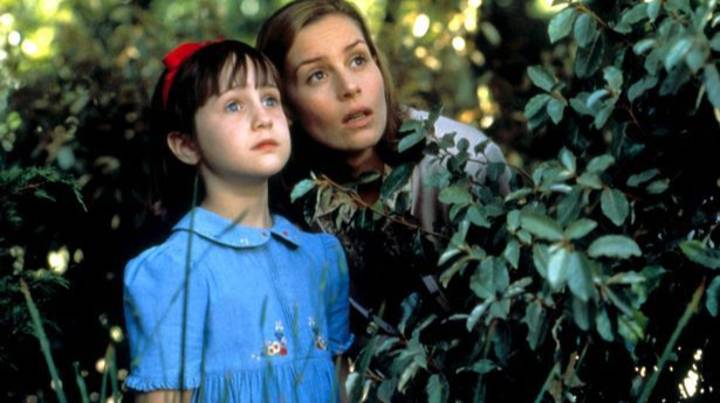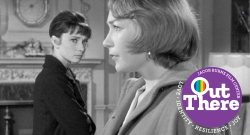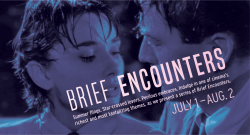Posted March 2, 2022
Celebrate Women's History Month: Essential Films to Watch with Your Kids
by JBFC Kids curator and Education Program Manager Emily Ohara
Drawing on the JBFC’s education programming and its emphasis on films from around the world, the Jacob Burns Film Center is proud to share a list of films to watch with your kids this Women’s History Month that will foster empathy. Curated by JBFC Kids curator and Education Program Manager Emily Ohara, this list highlights films that are enjoyable for children and adults alike, and sure to spark important conversations between parent and child:
1. My Neighbor Totoro (Hayao Miyazaki, 1988)
From the legendary Studio Ghibli, creators of Spirited Away and Ponyo (another must-see), comes a classic animated tale of magic and adventure for the whole family. When Satsuki and her sister Mei move with their father to a new home in the Japanese countryside, they soon discover that the house and nearby woods are full of strange and delightful creatures, including a gigantic but gentle forest spirit called Totoro. The two sisters set off on a series of adventures with Totoro and his forest friends in this all-ages animated masterpiece that will surely tug on everyone’s heart strings.
My Neighbor Totoro touches on themes of sibling relationships, determination, and the beauty of nature and imagination. Rated G; available to stream on HBO Max, Amazon, YouTube, Google Play, Vudu, and Apple TV.
2. The Eagle Huntress (Otto Bell, 2016)
Aisholpan is a thirteen-year-old girl striving to be the first female eagle huntress from a Mongolian nomad family. In this gorgeously shot documentary, wide in scope but cohesive in heart and narrative, the aspiring huntress has an almost sacred experience with her bird. “I just want my daughter to love her life,” Aisholpan’s father comments early on in the film. And by loving her life, this includes a “relentless commitment to expressing her true self.”
The Eagle Huntress deals with issues of the environment, empowerment of young girls, and women in sports. Rated G; available to stream on YouTube, Vudu, Google Play, Amazon, and Apple TV
3. Matilda (Danny DeVito, 1996)
Who could forget the lovable and brilliant Matilda? Based on the Roald Dahl novel of the same title, this film tells the story of a young girl whose topsy-turvy world begins to spiral even further out of control as she faces the evil forces of her neglectful parents and terrifying principal. Matilda is an instant hero and an inspiration to girls everywhere.
Matilda is an adorable tale that, for all its whimsy, highlights the importance of education and being true to yourself. Rated PG; available to stream on Starz, Amazon, YouTube, Vudu, Google Play, and Apple TV.
4. Real Women Have Curves (Patricia Cardoso, 2002)
Patricia Cardoso’s Real Women Have Curves stars America Ferrara (Sisterhood of the Traveling Pants, another worthwhile watch), as a Mexican-American teenager torn between wanting to further her education and pleasing her traditional family by holding on to her cultural heritage.
Many film critics have noted the impact of Real Women Have Curves on 2017’s breakout, female-centric hit Lady Bird. If you’ve seen both, compare and contrast the two with your child! Rated PG-13; available to stream on HBO Max, Amazon, Apple TV, YouTube, Vudu, and Google Play.
5. 3rd Period (Reweina Tessema, 2017)
3rd Period, a short film directed and narrated by Creative Culture Fellow Reweina Tessema, is a creative and humorous recount of a true story from middle school. Absent-minded seventh grader Reweina finds herself in an awkward learning experience with the weirdest teacher in school after getting her period in the middle of English class!
3rd Period reminds us all how the embarrassing stories of one’s life can produce long-lasting lessons around empathy and kindness from strangers. Rated PG; available to stream for FREE on the JBFC’s Short Film Library. Click here to sign up.
6. Wadjda (Haifaa al-Mansour, 2013)
Wadjda, directed by the first female Saudi filmmaker and the first feature-length film ever shot in Saudi Arabia, continues with the theme of competition. This coming-of-age tale features a preteen girl determined to purchase a bicycle. She signs up for a Koran recitation competition to earn enough funds to purchase her dream bike, becoming increasingly educated and empowered along the way
Wadjda tackles gender inequality in the developing world. Rated PG; available to stream on Netflix, Amazon, YouTube, Vudu, Google Play, and Apple TV.
7. Whale Rider (Niki Caro, 2002)
Whether you read the book or were introduced to this story as an Academy award-nominated masterpiece, Whale Rider is a force to be reckoned with. Paikea, the film’s main character, belongs to a Maori tribe on the coast of New Zealand, a society still heavily influenced by the patriarchy. As Paikea’s aspirations for the tribal chief role take shape, her ambitions butt up against the traditions of her grandfather Koro.
Whale Rider deals with ancestral authority, the traditions and family structures of indigenous populations, and women in power.
Rated PG-13; available to stream on Kanopy, Hoopla, Amazon, YouTube, Vudu, Google Play, Alamo Drafthouse On Demand, and Apple TV. Have a class? Bring your students to watch and discuss the film in-person or virtually at the Jacob Burns Film Center. Click here to register!
Whether you borrow a film from your local library or stream it online, we hope that you get the chance to watch these great films with your family! If you are not sure what age a film is appropriate for, visit Common Sense Media, a nonprofit organization that provides independent, age-based, and educational ratings and reviews for movies.
More importantly, take the opportunity to have a thoughtful discussion with your children, relatives, and students.
Not sure what to talk about? Here are a few starter questions to get you going:
- What was your favorite part of the film? Why?
- What are some ways in which boys and girls are treated differently in this film?
- What would you do if you were in [protagonist’s] position?
- How is your life different from or the same as [the protagonist]?
- How can we work to improve the lives of women and girls around the world?
To learn more about our kids film programing, please visit the JBFC Kids series page. You can also learn more about the JBFC’s Short Film Library, as well as other education programs and resources, on our Education website.
Want to stay up to date on what’s happening at the JBFC? Make sure to sign up for our ebulletin HERE.



